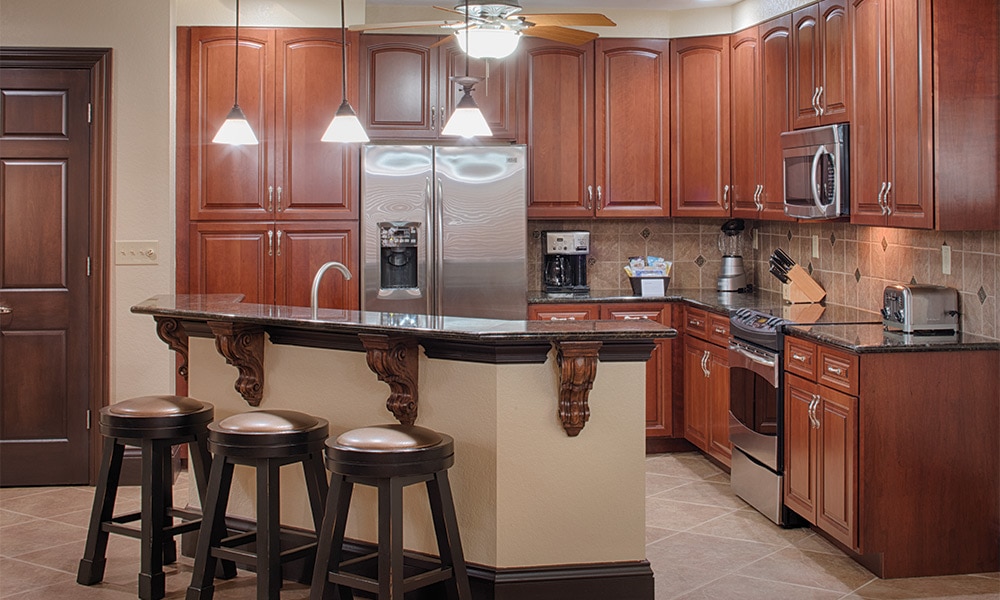Timeshare vs Hotel: A Comprehensive Guide


One of the most important decisions you'll face when planning future getaways is where to stay. Do you stick with the familiar booking experience of a hotel stay or dive into the world of timeshares? Each option has its own unique benefits, and choosing the right one can make or break your vacation experience.
In this guide, we'll examine the pros and cons of timeshares and hotels and explain why timeshares might be the better choice for those who vacation annually.
Understanding Timeshare vs. Hotel
Brief Overview of Timeshare and How It Works
First, how do timeshares work? Timeshares are properties with divided ownership or usage rights. Owners purchase the right to use a specific unit at a predetermined time every year. Alternatively, they buy points in a vacation club and redeem them at various locations in that timeshare's portfolio of resorts.
Core Differences Between Timeshares and Hotels
At a high level, there are a few key differences when comparing timeshares vs. hotels:
- Upfront cost: Timeshare owners pay an upfront purchase price plus annual maintenance fees, whereas hotel guests book and pay per night.
- Amenities and services: Timeshare properties offer a range of amenities included in the cost of ownership. With hotels, amenities may come at an additional cost and can differ between hotels.
- Flexible booking: Hotels allow travelers to book rooms at the last minute and choose different locations for each stay, whereas timeshare stays may be limited to specific locations and availability.
Unpacking the Benefits of Timeshare Ownership
Exploring the Amenities: From Swimming Pools to Full Kitchens
Timeshares are renowned for their extensive range of amenities, which cater to the needs of both long-term stays and family vacations. Unlike typical hotel rooms, timeshare units often feature full kitchens, allowing families and groups to save money by cooking their own meals rather than dining out. Additionally, these properties usually include access to swimming pools, spas, fitness centers, and recreational areas, all maintained to high standards to ensure a consistent guest experience every year.
Timeshare Resorts vs. Luxury Hotels: Comparing On-Site Facilities
When comparing facilities at timeshare resorts and luxury hotels, it's clear that both aim to offer an exceptional level of comfort and luxury. However, timeshare resorts offer a more consistent experience, especially for those who return year after year. These resorts often feature beautifully landscaped grounds, large pools with water features, children's play areas, and on-site entertainment. Luxury hotels may offer similar amenities, but the availability and quality can vary significantly from one location to another, depending on the brand and management.
Understanding the Financial Aspect: Maintenance Fees vs. Hotel Rates
Financially, owning a timeshare requires an initial investment and regular maintenance fees, which cover the upkeep of the property and its amenities. While these fees can be a consideration, they generally remain stable over time, protecting owners from the seasonal price spikes typical in the hotel industry. Hotel rates can fluctuate dramatically based on location, time of year, and demand, making budgeting for hotel-based vacations more unpredictable. The predictable cost of timeshares for frequent travelers can make long-term budgeting easier and potentially cheaper than hotels over many years.
Vacation Club Memberships and Their Added Value
Vacation club memberships enhance the value of timeshares by allowing owners to use their allotted time at affiliated resorts worldwide. The points-based system operates on a points basis, where owners use points to book stays at different locations, depending on availability and point value. This points-based system can significantly increase the variety of one's vacation experiences, offering access to a global network of high-quality resorts without the need to own multiple properties. Additionally, many vacation clubs provide exclusive benefits such as travel discounts, priority bookings, and special events, adding substantial value beyond just accommodation.


Considering Hotels: The Pros and Cons for Leisure Travelers
The Flexibility of Hotel Room Booking
One of the main advantages of hotels is their flexibility. Hotels allow travelers to book accommodations almost anywhere in the world, often last minute, with no long-term commitments. This flexibility is ideal for those who prefer spontaneous travel or do not vacation consistently enough to justify a timeshare. However, this flexibility can also be a drawback. Without the commitment to a specific location or quality standard, the experience can vary significantly between stays. Travelers may find themselves in less desirable locations or in accommodations that don't meet their expectations, especially during peak travel seasons when options are limited.
Evaluating the Cost: Daily Rates and Lack of Long-term Benefits
Hotels can initially seem like a cost-effective option because they don't require a large upfront investment like timeshares. Yet, the cost of hotel stays can accumulate significantly over time, particularly for frequent travelers or families who book larger rooms or multiple rooms. Additionally, hotel prices can fluctuate widely, influenced by factors like seasonality, location, and demand, making budget planning unpredictable and often more expensive during peak periods. Unlike timeshares, spending on hotels does not contribute to an investment in real estate, nor does it guarantee that vacation costs will be stable over the years.
Amenities and Services: What You Pay Is What You Get
Hotels often advertise various amenities—from on-site restaurants and concierge services to fitness centers and spas. While these can enhance a vacation, access to such amenities usually comes at a premium. The level and quality of services are often inconsistent and depend heavily on the hotel's star rating and management. Additional fees may apply for things like WiFi, parking, and resort fees, adding unexpected costs to your stay. In contrast, timeshares typically include amenities in the ownership cost, providing a more predictable and inclusive vacation experience without the nickel-and-diming often associated with hotels.
This analysis shows that hotels offer unparalleled flexibility and ease of booking. However, they can also present less predictable costs, varying quality, and the potential for less satisfactory vacation experiences compared to timeshares. For those who vacation regularly, the consistency, predictable pricing, and home-like amenities offered by timeshares may present a more appealing and cost-effective option over the long term.
The Financial Perspective: Timeshare vs Hotel Cost Calculator
Breaking Down the Costs: Initial Investment, Annual Maintenance vs. Hotel Stays
The upfront purchase price of a timeshare can be a significant cost, often ranging from several thousand to tens of thousands of dollars, depending on the location, unit size, and the resort's prestige. Additionally, owners are responsible for annual maintenance fees. However, this one-time investment and the predictable yearly fees can equate to considerable savings over time compared to the cumulative cost of hotel stays. Hotels, particularly in popular destinations, can have high per-night rates that increase during peak seasons or special events. A weeklong hotel stay can vary wildly from year to year and could end up costing thousands of dollars during high-demand periods, adding up to a substantial amount over decades.
How Timeshare Can Be a Cost-Effective Option in the Long Run
For regular vacationers, especially those who travel yearly, the cost-effectiveness of timeshares becomes apparent when spread over many years. Unlike hotels, where prices may increase due to inflation and demand, the annual costs associated with timeshares remain relatively stable, aside from manageable increases in maintenance fees. Over 10 or 20 years, the predictable expenses of timeshare ownership can stabilize vacation budgets, protect against peak season rate hikes, and offer accommodation savings compared to the escalating costs of comparable hotel stays. Furthermore, timeshare resorts often provide larger accommodations and amenities, which would be much more expensive if booked through hotels.
The Resale Market and Timeshare Rentals: Hidden Opportunities
Timeshare ownership also includes the potential to recoup some initial investment through resale or rental. Although the resale market for timeshares can be challenging, with proper pricing strategies and timing, owners can sell their shares in the secondary market, potentially recovering part of their initial outlay. Additionally, owners not planning to use their allotted time in a given year can rent out their timeshare to cover maintenance fees or even turn a profit. This flexibility can make timeshares more attractive to those looking to maximize their investment in vacation properties.
In contrast, money spent on hotels offers no return or asset ownership. The transient nature of hotel stays means each payment is final, providing only the immediate value of a night's stay with no long-term benefits. This stark financial contrast underscores how timeshare ownership can be a more sound financial decision for regular travelers, offering vacation experiences and potential for economic return or savings.
Making the Decision: Is Timeshare or Hotel Better for Your Vacation Style?
Addressing Common Questions and Concerns About Timeshares and Hotels
Deciding between a timeshare and a hotel often depends on individual travel habits, preferences, and long-term vacation goals. Timeshares appeal to those who value consistency in their vacation accommodations and enjoy returning to the exact location (or using a points system to explore new areas within a network). They particularly appeal to those who prefer more residential and home-like vacations, with the added benefit of cost predictiveness and potential savings in the long run. On the other hand, hotels offer maximum flexibility, ideal for those who do not vacation annually, like to make last-minute plans, or frequently change their vacation destinations.
Personalizing Your Vacation: Matching Accommodation to Lifestyle
When it comes time to decide on accommodations, your travel frequency and vacation style play a crucial role in choosing between timeshares and hotels. For those who plan to travel frequently or return annually to a favorite destination, timeshares offer a sense of ownership and a consistent, reliable experience. Families especially benefit from the additional space and amenities like kitchens and multiple bedrooms, which are often part of timeshare properties but can be costly in hotels. For many leisure travelers, the financial and experiential benefits of timeshares can significantly outweigh those of hotels, particularly in terms of comfort, cost predictiveness, and overall satisfaction.
However, for those who seek variety and spontaneity or do not vacation regularly enough to justify the upfront cost of a timeshare, hotels remain the go-to choice for their wide range of options and commitment-free bookings.
Comparing timeshares and hotels is an important part of determining whether timeshares are worth it. With pros and cons for each, you can decide for yourself which accommodations are right for you — and enhance your travel experience rather than complicate it.
FAQ Section
What's the difference between a timeshare and a hotel?
- A timeshare offers the right to use a property for a specific period each year, whereas a hotel offers more short-term, flexible lodging options.
Are timeshare owners happy?
- According to the American Resorts Development Association (ARDA), approximately 85% of owners report being satisfied with their timeshare.
What is the difference between a timeshare and a condo hotel?
- A condo hotel is typically owned outright and can be rented out when not in use by the owner. It offers more flexibility than traditional timeshares but with similar benefits.
What is the point of owning a timeshare?
- Owning a timeshare can be a cost-effective way to ensure annual vacations at a fixed cost with many amenities included.



